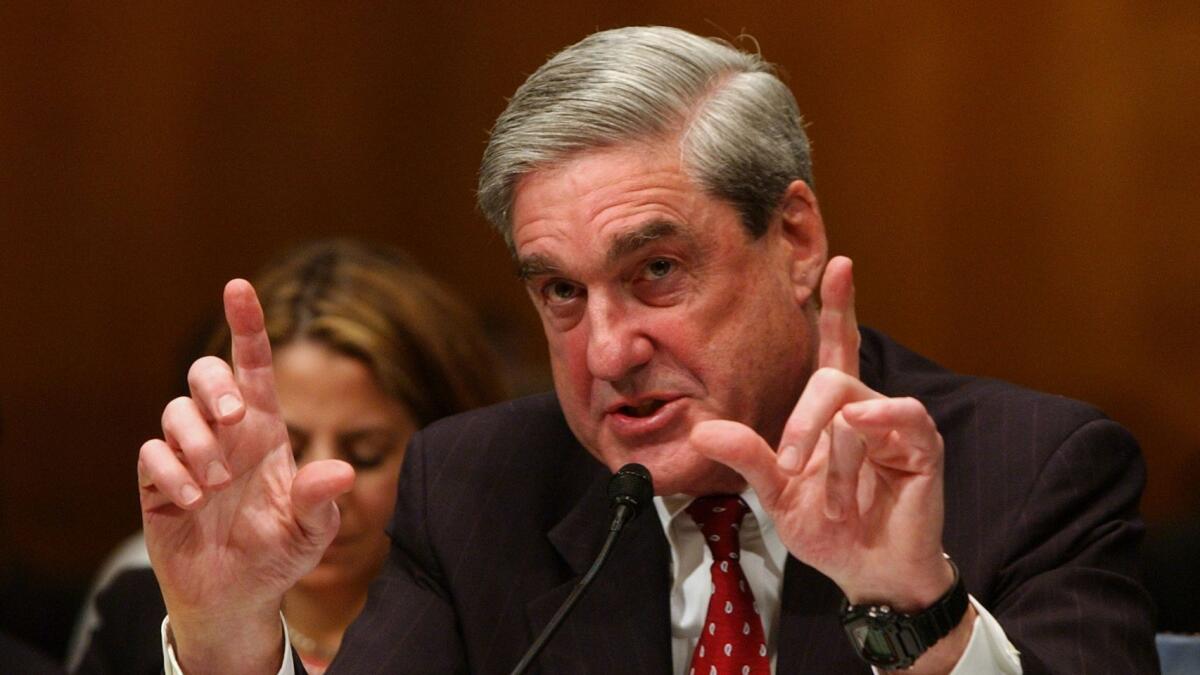Editorial: Better late than never in appointing Mueller to investigate Trump. Now it’s Congress’ turn to step up

- Share via
In announcing Wednesday that he would appoint a special counsel to supervise the Justice Department’s investigation of Russian interference in the 2016 presidential election and “related matters” — including possible collusion by members of President Trump’s campaign — Deputy Atty. Gen. Rod Rosenstein emphasized the need “for the American people to have full confidence in the outcome.”
Talk about stating the obvious. Rosenstein’s action is welcome, his reasoning is sound and the lawyer he has asked to assume responsibility for the investigation, former FBI Director Robert S. Mueller III, is a reassuring choice.
But Rosenstein had no alternative, if he wanted to salvage his reputation. The belated decision to appoint a special counsel is almost certainly the result of the clumsy firing last week of FBI Director James B. Comey and the administration’s cynical, deceptive use of Rosenstein to justify it.
The White House originally portrayed Comey’s dismissal as its response to a memo by Rosenstein criticizing the way Comey handled the investigation of Hillary Clinton’s use of a private email server. That explanation collapsed when Trump himself admitted that he would have fired Comey regardless of Rosenstein’s advice and that, moreover, when he decided to fire Comey he was thinking about the “made-up story” of allegations of collusion between Russia and the Trump campaign.
The administration’s use of Rosenstein to justify Comey’s dismissal made it imperative that the deputy attorney general withdraw from the Trump-Russia investigation. (Atty. Gen. Jeff Sessions, who as a senator from Alabama was an enthusiastic supporter of Trump’s candidacy, had already recused himself from the matter in March.)
Why did Rosenstein wait until Wednesday to hand over the Russia investigation to someone else? Perhaps he was jolted into action by shocking news reports suggesting that Trump had asked Comey to shut down an investigation of former National Security Advisor Michael Flynn. Better late than never, Rosenstein decided that the public needed to be assured that an investigation of Trump connections with Russia would be free of political influence.
Mueller will now be responsible for supervising investigations of “any links and/or coordination between the Russian government and individuals associated with the campaign of President Donald Trump.” — including, presumably, any questionable activities by Flynn.
Mueller won’t have total independence; under Justice Department regulations, Rosenstein could still countermand some of his decisions if he deemed them “inappropriate or unwarranted under established departmental practices.” But Mueller will enjoy considerable autonomy bolstered by his own high standing in the department and in Congress.
A thorough investigation by the FBI and the Justice Department, important as it is, will proceed mostly in secret and can’t answer all of the questions the public has about Russian meddling in last year’s election. That’s why it’s vital that Congress do its duty to investigate these events — in public to the greatest extent possible.
Follow the Opinion section on Twitter @latimesopinion and Facebook
More to Read
A cure for the common opinion
Get thought-provoking perspectives with our weekly newsletter.
You may occasionally receive promotional content from the Los Angeles Times.






